BPC-AI | Le logiciel de business plan collaboratif boosté à l’IA
 +33 6 61 95 64 95
+33 6 61 95 64 95How a Business Plan Application for Entrepreneurs Can Help You Create an Effective Business Plan
Creating a business plan is a critical step for any entrepreneur looking to launch or grow a business. This document serves as a roadmap, outlining the company’s strategy, objectives, and the methods to achieve them.

Creating a business plan is a critical step for any entrepreneur looking to launch or grow a business. This document serves as a roadmap, outlining the company’s strategy, objectives, and the methods to achieve them. Traditionally, drafting a business plan has been a time-consuming and complex task. However, with the rise of business plan applications designed specifically for entrepreneurs, the process has become far more accessible and efficient. These tools allow you to structure your business plan quickly, while also offering powerful features such as automated financial forecasts, market analysis, and scenario simulations.
In this article, we will explore how a business plan application for entrepreneurs can transform the process of creating a business plan, making it faster, more precise, and better suited to the specific needs of entrepreneurs. We will look at the benefits, key features, and why these tools are becoming essential for start-ups and small businesses.
Why Use a Business Plan Application for Entrepreneurs?

The process of creating a business plan is essential for entrepreneurs, but it can often feel overwhelming. Many entrepreneurs lack the time, expertise, or resources to create a comprehensive business plan. This is where a business plan application comes into play, offering simplified, guided tools to help entrepreneurs create a structured and detailed plan without needing extensive financial or strategic knowledge.
- Ease of Use: Business plan applications are designed to be user-friendly and intuitive. They allow entrepreneurs to create a plan by following guided steps, with templates and examples tailored to their specific industry.
- Time-Saving: Instead of spending hours formatting documents, business plan applications automate the layout and organization of the plan’s sections. This lets entrepreneurs focus on strategic content rather than on design.
- Access to Real-Time Data: Some applications integrate market analysis or benchmarking tools, allowing users to compare their project with others in the same industry. This provides valuable insights that can guide the development of the business plan.
- Flexibility and Adaptability: A business plan is never static. Entrepreneurs often need to modify it as their project evolves. Applications make it easy to update data and financial projections with just a few clicks.
Key Features of a Business Plan Application for Entrepreneurs

Business plan applications come with various features that allow entrepreneurs to structure their project efficiently. Here are some of the most important features:
Automated Financial Forecasting
Financial forecasting is a critical element of a successful business plan. It helps estimate funding needs, projected expenses, potential revenues, and expected profitability. Business plan applications automate this process, making calculations faster and more accurate.
- Cost Estimation: The application calculates fixed and variable costs related to the business’s operations, such as salaries, rent, raw materials, and marketing expenses.
- Cash Flow Forecasting: Entrepreneurs can visualize how their cash flow will evolve over several months or years, based on anticipated revenues and expenses. This helps avoid cash shortages and better plan financing needs.
- Profit Margin Analysis: The application automatically calculates gross and net profit margins, helping entrepreneurs better understand their project’s break-even points.
Market Analysis and Competitor Research
A solid market analysis is essential for a strong business plan. It helps define the size of the target market, identify industry trends, and analyze competitors. Business plan applications often include built-in market analysis tools to simplify this task.
- Market Segmentation Analysis: The application allows you to break down the target market into different segments (e.g., by age, gender, geography) and analyze their potential.
- Competitor Analysis: Entrepreneurs can use the application to research their main competitors, study their business models, strengths, and weaknesses, and identify opportunities for differentiation.
- Trend Identification: Some applications come with tools that track emerging trends in the company’s sector, allowing the business plan to be adapted accordingly.
Templates and Business Plan Examples
For entrepreneurs who have never written a business plan, most applications offer templates and examples tailored to different types of businesses (retail, services, technology, etc.). These templates can be customized to meet the specific needs of each project.
- Industry-Specific Templates: These templates are designed to meet the specific needs of each industry. For example, a business plan for a tech start-up will look very different from one for a clothing store.
- Sample Financial Projections: Entrepreneurs can draw inspiration from sample financial projections already included in the application to create their own forecasts.
- Interactive Guides: The applications often provide practical advice at each step of the business plan creation process, helping entrepreneurs answer critical questions (target market, marketing strategy, etc.).
Benefits of a Business Plan Application for Start-ups

Start-ups face unique challenges when creating a business plan. They need to demonstrate their viability quickly while maximizing the use of their resources. A business plan application can be a game-changer for these young companies.
- Access to Relevant Data: Start-ups can access accurate and up-to-date databases to support their market analysis, which is essential for convincing investors.
- Speed of Execution: Thanks to the automation of certain tasks, start-ups can create a detailed business plan in record time, allowing them to focus on customer acquisition and product development.
- Ease of Updates: Start-ups evolve quickly. A business plan application allows for easy modification and adjustment of the plan as the company grows and new data becomes available.
Project Management Optimization with a Business Plan Application
Beyond creating the business plan, these applications can also be used to optimize project management. Effective planning is crucial to achieving the goals set in the business plan.
- Tracking Objectives: Business plan applications allow entrepreneurs to set milestones and track the progress of projects related to each strategic objective.
- Resource Management: Entrepreneurs can use these tools to allocate resources (financial, human, and material) efficiently based on the priorities set in the business plan.
- Dashboards: Dashboards allow entrepreneurs to visualize their project’s status at a glance, tracking key performance indicators (KPIs) to ensure objectives are being met.
Automation and Cost Reduction

One of the primary advantages of a business plan application is the ability to automate a large part of the creation process, which helps reduce the costs associated with drafting the plan.
- Automation of Repetitive Tasks: Data collection, financial analysis, and layout formatting can all be automated, reducing errors and the need for manual labor.
- Increased Efficiency: By allowing entrepreneurs to create business plans more quickly and efficiently, these tools reduce the overall cost of the planning process.
Conclusion: An Essential Tool for Entrepreneurs
The use of a business plan application for entrepreneurs is revolutionizing the way business projects are conceived and executed. With automated financial forecasts, real-time data access, and customizable templates, these tools make it easier to create solid, accurate business plans that reflect market realities.
For start-ups and small businesses, these applications are invaluable tools that help save time, improve decision-making, and focus on what really matters: growing the business and achieving strategic goals.


